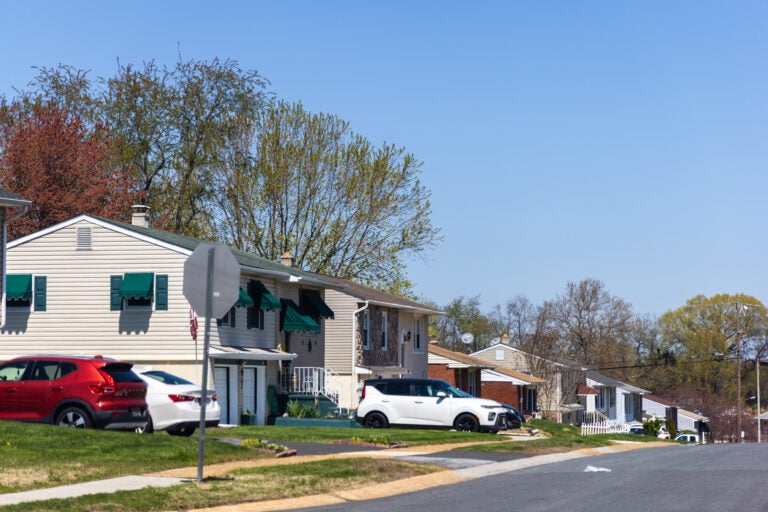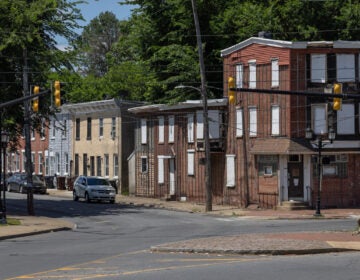‘Unfair burden’: Residents complain about high tax bills as Delaware lawmakers float ideas to provide relief
New Castle County homeowners are crying foul after residential taxes rise while tax bills for some major companies fall.
Listen 1:10
Homes in New Castle, Delaware. (Kimberly Paynter/WHYY)
What are journalists missing from the state of Delaware? What would you most like WHYY News to cover? Let us know.
Questions are swirling around the methods used by the company Delaware counties hired to reassess property values as state lawmakers prepare to go into a special session on the issue later this month.
New Castle County Councilmembers David Tackett and Brandon Toole have requested an independent audit of how Tyler Technologies, a third-party contractor, valued residential and non-residential properties.
Much of the tax burden in New Castle County has fallen on homeowners while many commercial properties saw decreases. Frustrated residents have taken to social media, attended city and county council meetings and contacted their state representatives to voice their anger over new valuations that may have risen hundreds of dollars or more.
“My mailbox is full every day from emails of constituents who say they’re going to lose their homes,” Tackett said. “There’s seniors who are on fixed incomes. A lot of people live paycheck to paycheck now.”
In the midst of residents decrying the increases, blame is falling on Tyler’s methodology, schools districts who took advantage of state law allowing them to exact 10% revenue increases after reassessments, and the vacancy rate in the city of Wilmington. Lawmakers have floated several proposals aimed at helping New Castle County residents deal with the large hikes.
Tyler Technologies’ methodology
The company used two different methods for evaluating residential and non-residential properties. It determined the values for residential properties based on sales comparison data and the physical inspection of buildings and land, which is a requirement set forth in the Delaware Constitution. Tyler used income information for commercial, utilities and industrial facilities.
Several county and state officials say they’re concerned about the way Tyler valued the commercial properties, including whether it violated Delaware law.
In an emailed response, Tyler officials said the company has not received a request from the county to participate in an audit. Their statement did not address whether the method used for non-residential properties complied with state law, but said it used industry best practices, such as the sales comparison and income approaches, to ensure commercial land is valued fairly and consistently.
“I’d like to see a little bit more assurance to the public that this was done as fairly as it possibly could have been done,” Tackett said. “The community right now is at a point where they are confused and don’t understand what this process is or how it worked, and they’re struggling to get answers.”
Residential and commercial disparities
New Castle County Councilmember Dave Carter said property owners, such as homeowners, condo owners and land owners, all saw their properties go up in value faster than commercial and other properties over the past 40 years.
New Castle County’s chief financial officer, Jill Floore, told the county finance committee earlier this month that residents are seeing their share of the tax burden swell from 67% to about 76%. The city of Wilmington said earlier this year that residential properties are now 57% of its tax base while commercial properties make up just 29%.
Some New Castle County Council members argue the commercial vacancy rate in the city of Wilmington is to blame for the disparities, not the method Tyler Technologies used to determine commercial market value.
A recent report from Newmark, a commercial real estate firm, puts the city’s vacancy rate at 19.8%. That’s similar to June’s national vacancy rate of 19.4%, according to real estate blog Commercial Cafe.
The high vacancy rate in downtown Wilmington is due in part to the continued popularity of working remotely, which took off when the COVID-19 pandemic hit in early 2020.
Some major companies in Wilmington are seeing tax decreases, which is providing fuel to county, city and state elected officials who are demanding a review of Tyler’s work.
For example, M&T Bank saw a drop of about 50% in its bill, from $997,304 in 2024 to $444,927 this year. Amazon saw its overall tax bill plummet from about $3.5 million last year to about $1 million this year, a $2.5 million decrease.
Wilmington City Councilmember Christian Willauer is echoing the call for an audit by New Castle County Councilmembers Tackett and Toole.
“The real problem is that the new property tax assessments for many large corporations and million dollar homes are way too low while the new assessments for many small businesses and homeowners with modest homes are too high,” Willauer posted on Facebook. “As a result, many corporations and wealthy homeowners are seeing their property tax bills go down by a lot, with some getting reductions of 50% or more, while working and middle class homeowners are getting bills that are 20%, 50%, even 100%+ higher than last year.”
During last month’s county finance committee meeting, Michael McFarlane, manager of Southern Appraisal Region & Consulting Services with Tyler Technologies, said a much higher percentage of vacant commercial properties caused many of those properties to go down in value. He defended the income method used for commercial and other non-residential properties.
New County Councilmember Kevin Caneco argued in support of Tyler’s process during the finance committee meeting.
“You might fundamentally disagree with the assessment, but it does not mean that the numbers were wrong or the counting was wrong,” he said. “It means that, unfortunately, we have a changing market.”
New Castle County for the first time did separate rates for residential and commercial properties to address the disparities. The city of Wilmington also did separate rates.
School taxes make up the majority of county invoices. Several school districts took advantage of state law, which allows them to exact a 10% increase in revenue after property reassessments. They’re also facing blowback from elected leaders, including from Gov. Matt Meyer. Districts who raised additional revenue of between 1% and 10% include Red Clay, Christina, Appoquinimink and Indian River.
Proposed legislation
Meyer said in July he supported state lawmakers’ move to hold a special session to address what he called “outrageous tax bills.” Meyer was New Castle County executive when the assessments by Tyler Technologies began.
State Rep. Mike Smith, R-Pike Creek, is reintroducing legislation that would remove school districts’ ability to raise additional revenue after property assessments.
“I think it would be a good partnership with the school districts to show us why they do need the money and what it’s for,” he said. “I think it should be data driven. We should see exactly why you have a need.”
Most of downtown Wilmington is in the Christina School District. School board member Doug Manley said the median homeowner’s bill rose about $600 while many large commercial properties downtown are paying much lower property taxes this year. He said lawmakers allowing districts to also split the tax rates would provide better equity among residential and non-residential properties.
“What we’re asking the state to do is, if your county split the tax bill for itself, then the school district in that county should be able to do, at minimum, what the county did,” he said.
State Rep. Kim Williams, D-Stanton, is crafting legislation to allow school districts to do just that.
“This has been a really unfair burden to their constituents, and as well as constituents that we represent in this area,” she said.
She said like many other homeowners, she has also seen her taxes rise. Her home went up 800% in value and her taxes approximately doubled.
“I’m just one of many, but that’s the difference,” she said. “So you have people who have paid their homes off or on fixed income and have been hit hard by this. It’s unacceptable.”
Another proposal that legislators could consider would change the requirement that counties do property assessments from every five years, which became law in 2023, to every 10 years. Prior to this round of property assessments by the three counties, it had been more than 40 years since properties had been last assessed.
House and Senate Democratic leadership said in a news release they will also consider other policies during the special session, including the following:
- Allowing eligible residents to enter into payment plans with no penalty or interest for school taxes
- Decreasing New Castle County’s late payment fees for those not enrolled in or eligible for payment plans from 5% to 1%
- Requiring New Castle County refund residents’ overpayments if they successfully appeal their property values
This story was supported by a statehouse coverage grant from the Corporation for Public Broadcasting.

Get daily updates from WHYY News!
WHYY is your source for fact-based, in-depth journalism and information. As a nonprofit organization, we rely on financial support from readers like you. Please give today.







